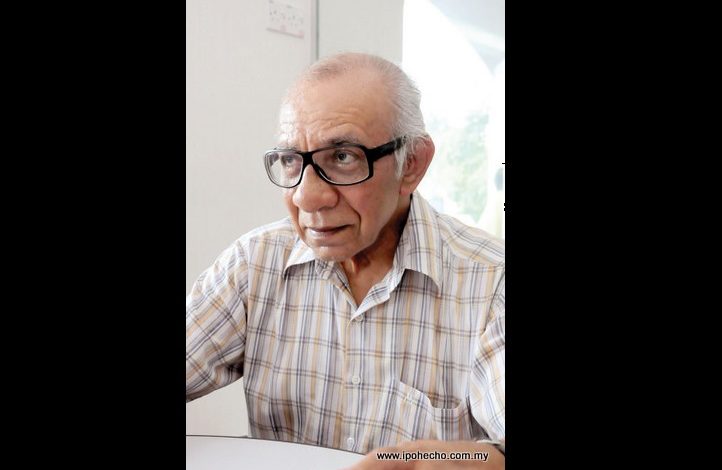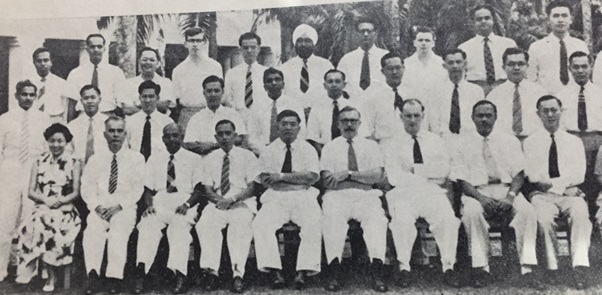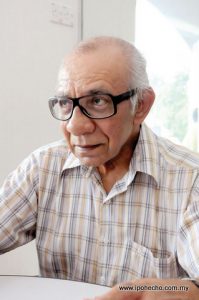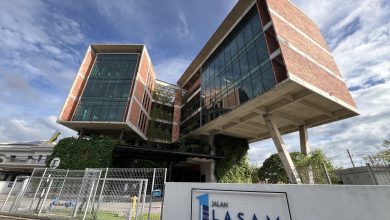

By Prema Arasu
Anwar Hassan kindly offered a few hours of his precious time away from family and charitable work to let me record some of his thoughts and adventures from over the last 70 some years. On reviewing my draft, he deleted the words “Dato’ Dr.” and said, “Those titles are not of importance anymore.”
This is another story offered to Ipoh Echo’s readership and the younger generation, with the hope of keeping alive the history, hopes and memories of some eminent Perakeans.
*This is the second part of a two-part series
***
Another Tale Worth Telling (Part 2)
As part of Career Guidance in Form 6, our teachers took us to visit various institutions in town such as the Geological Survey Department; the General Hospital; the Veterinary Research Institute (VRI) and such. Something happened there at the VRI that caught my attention.
Firstly, the officers including Dr. Chong Sue Kheng and Dr. Cheah Phee Phay met our student group and took the time to welcome us and explain what they were doing. I remember that they showed us different things and one of them was something through a microscope. It was a magnified image with dark field illumination of a twirling creature. They told us that it was a bacteria called Leptospira and that it caused a serious disease in people and animals. For some reason, those spiral, Cinderella-like dance movements just captured my imagination. That image stuck in my brain and sparked a thought. I think that’s when I decided that I wanted to do this kind of work in a laboratory and be a veterinarian.
Coming from a poor background, coming from nothing, I knew I couldn’t afford to go to University on my own and would have to get a scholarship. We were also told by our teachers that getting a scholarship was very competitive and we had to do very well. As Science stream students, we had four major subjects. Good Principals meant getting As on Biology, Mathematics, Physics and Chemistry, and doing well in the General Paper. That created a problem for me as I was bad in Mathematics. In Forms 4 and 5, I did alright in Elementary Maths but not in Additional Maths, calculus and all that. Being bad at Maths meant that I was also not strong in Physics. I felt that the best I would do on the HSC exam would be to get 2 good Principals.
I asked my teacher what I needed to do to work in the laboratory at the VRI. My guidance teacher said “It’s not a popular option to choose veterinary sciences and maybe the competition won’t be high to get the scholarship that you need. Go for it.” So, I stuck with that plan.
During this time of finishing school and completing Form 6 studies, the Headmaster would invite a few students at a time for tea at his house. It was by rotation and students were selected based on who they felt were promising. We looked forward to going because his wife, Mrs. Ogle, would make these lovely English teas and snacks. It was their way of getting to know us better and teaching us some manners.


I remember there was a pot of black tea, and separate fancy ceramic jugs for the milk and the sugar. There were little spoons and you had to carefully mix it all to make your drink. This was so unlike what we got going to the cafeteria at the hostel or to a tea stall in town and getting a “Teh Tarik,” steaming hot with lots of milk and sugar and all done for you in a glass. I remember how at the Ogles’, we stared at the pot and cups, looked at each other and wondered what to do! Of course, Mrs. Ogle showed us the way it was done in the English tradition. But, we clunked our spoons and tea cups, and juggled holding the cups on the saucers, and got gently scolded. Before we left, we had learned about not touching the edge of the cup with the spoon and making no noise while stirring.
I succeeded in getting a Colombo plan scholarship to study in Canada and completed my degree in veterinary medicine at Guelph in Ontario. After that, I did a diploma course in pathology. I was inspired to do this post-graduate course because of hearing a lot during my pathology lectures about foundational research done by a Malaysian, Omar bin Abdul Rahman, while he was at Cambridge University. That made me so proud. It shows that teachers and others can inspire you to do a subject.
After completing my diploma course, I spent a few weeks traveling to see other parts of the world, like Berlin, Amsterdam and Beirut, before returning to Malaysia. My first job was at the VRI in Ipoh. I indeed fulfilled my dream. And to top that, my Head was that same Malaysian, Dr. Omar.


I later became Director of the VRI and retired as the Deputy Director General for Veterinary Services for Malaysia. Then I worked for a bit in the private sector and have devoted my time after retirement to non-governmental work and community service.
What teaches us good from bad, what makes for a good life?
When my father got ill, my parents moved back to Penang where I was born. I was starting my Form 6 and couldn’t visit them often. But during one visit, I noticed that my mother would sometimes disappear to run some errand late in the evening. Out of curiosity, I followed her. I was surprised that she was moving in the direction of the red-light district and then saw that she was giving food to a lady who had to work there. I found out later that this lady had to work as such to get money because she was treated badly by her husband, a policeman at that. I was so touched to see what my mother was doing despite the stigma associated with having to go to that area. I’m still so proud to think that she was not just my mother but also my role model. My mother cared for the welfare of others.
Religions are all the same in that way, they do teach us good from bad. When you’re in trouble, you have to resort to something. Or when something nice happens to you, you have to be grateful to something larger. And so I do believe people need a God and religion. But what goes wrong often is not the religion but the way it is practiced. The way people interpret religion to suit their own circumstances is what goes wrong.
I recently did a quick Google search about Einstein and his beliefs. I was curious about his take on religion and found that he made a comment about religion as espoused by the writings of Spinoza. Spinoza had a doctrine that was liberal, a simple philosophy. No belief in heaven or hell. So, I think, if I’m bad, it’s only because of my upbringing and circumstances, these are accidents in life. If that’s the case, “Why would one go to hell if you’re not in control of your circumstances?”
In recent years, I have been helping with orphanages and other community service. People donate based on religion and goodwill but some abuse those gestures. That bothers me. What I do now when a family needs help is that I help them directly. I don’t give it to a third party to handle. For instance, if I go down to Old town in Ipoh and someone says, “Help me, I need a meal.” I ask, “What do you want to eat?” Then I tell that person to go to that hawker’s stall and eat and I would go as well to pay for the meal.
As I reflect on my life, I wonder what the younger generation would learn from my experiences? I can only say that I wish I had had more balance between work, family and leisure time. One of my favourite school teachers and Hostel Master, Mr. Tate, would tell me that even though I was a night owl, it was important to sleep and get rest. Later in life, I got the same tip from one of my bosses who saw me working late. In life, he said you must divide your day into three blocks of 8+8+8, you must sleep for 8; work only for 8, no more; and use the other 8 for family, hobbies and other things.
***
© Prema Arasu, July 20 2020
=================================
About Prema Arasu:
Prema was formerly a student at the Ipoh Main Convent. She retired as a biomedical research scientist and professor from the U.S. academic system. She currently enjoys yoga, being out in nature, and doing short term projects related to science and global health.
wmnwsdm@gmail.com


